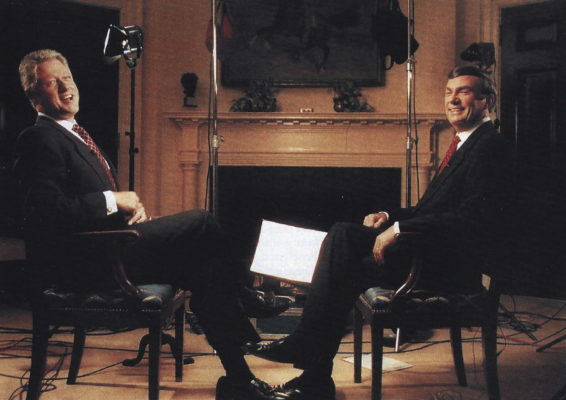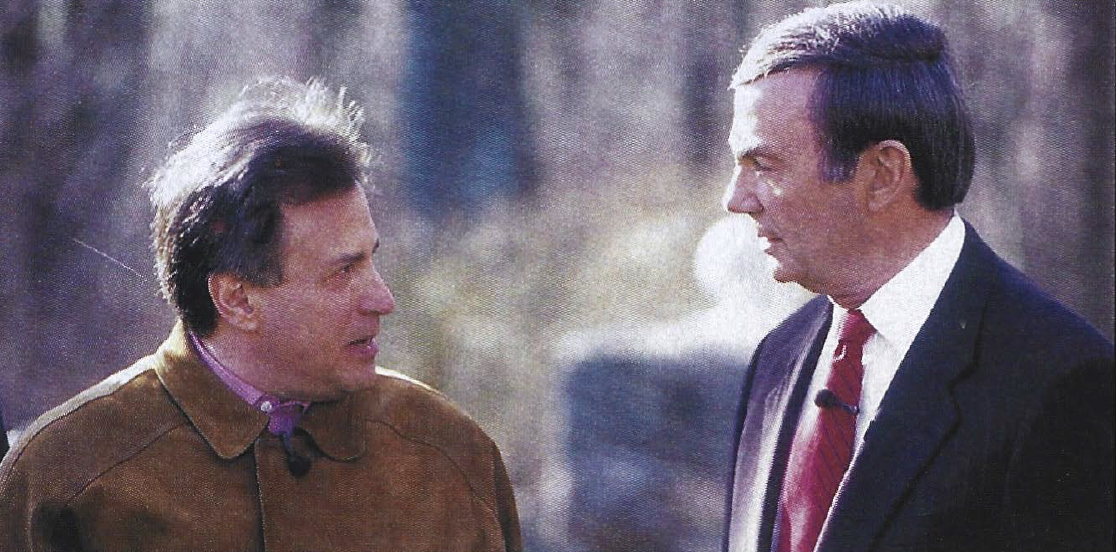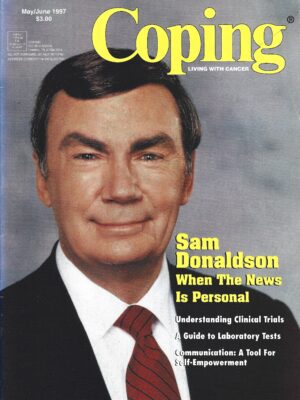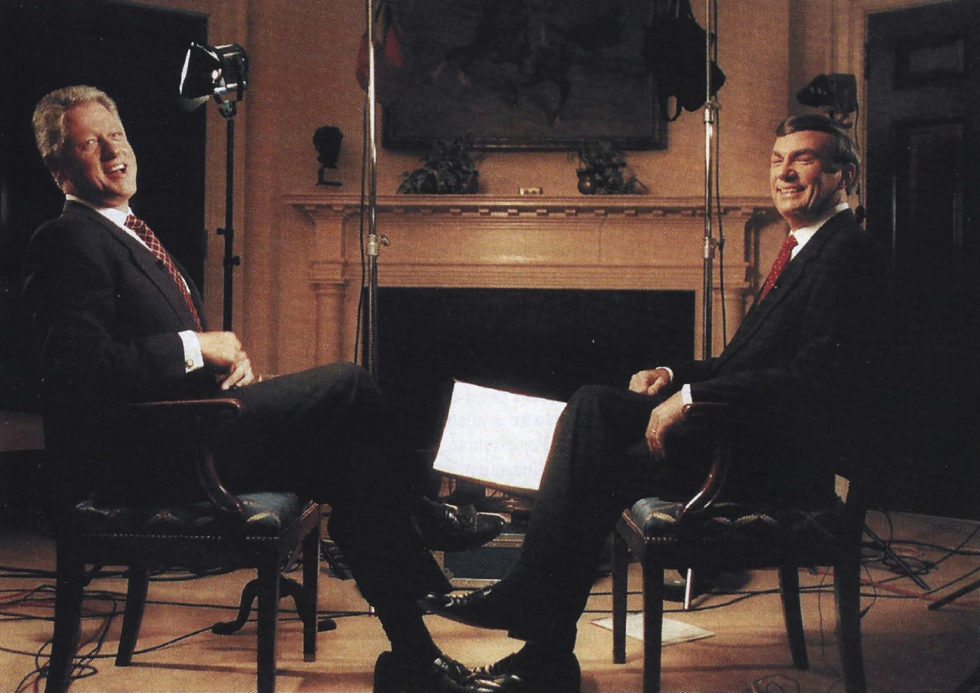When The News Is Personal
An Interview With Cancer Survivor Sam Donaldson
by Ellen Jordan
He has covered all major breaking news events, from the Vietnam War, Watergate, the House Judiciary Committee impeachment investigation and the Pan Am 103 bombing to the U.S. invasion of Panama and the Gulf War. He has interviewed every leading newsmaker in modern history, from Presidents Jimmy Carter, Ronald Reagan, George Bush and Bill Clinton to Chairman of the Joint Chiefs of Staff Colin Powell and Gulf Forces Commander General Norman Schwarzkopf. He has been named Best Television White House Correspondent in the Business and was selected Best Television Correspondent in the Business for four consecutive years. He has won three Emmy Awards and a George Foster Peabody Award for excellence. Yet, nothing Sam Donaldson has ever done has evoked the deep and lasting response of his ABC News PrimeTime Live documentary in October 1996 on his personal journey in the war on cancer.
There is hope for extending life for many, many people. I didn’t know this!
“I’ve been in this business forty years and I’ve never seen anything like it. The response has been overwhelming,” Donaldson says. “I feel very rewarded for having done it.” He began his journey unwittingly in July 1995. While soaping himself in the shower, Donaldson discovered an alarming egg-sized knot in his groin. A visit to his internist raised the immediate likelihood that the tumor was a melanoma that had spread from a dark brown mole removed from his ankle seven-and-a-half years earlier. His wife of 13 years, Jan Smith, a top television reporter for WTTG-TV in Washington, first spotted the mole while the Donaldsons vacationed in 1988. Initial lab results showed no cancer, but the plastic surgeon sent lesion samples to two more separate labs for confirmation. All reports were negative. “I have no quarrel with the plastic surgeon who removed the original mole,” Donaldson says. “You can miss malignant cells between slices. He was suspicious enough to get a second opinion.”
The mole was completely forgotten until that dreadful day in the shower. This time the biopsy came back positive. Donaldson prepared himself for the worst. He thought he was going to die. “I didn’t know a lot about melanoma, and I thought I had a very short time. It was not a death wish. As a lay person, I normally think I keep up with things. Look how ignorant I was. My immediate thought was I would die – and it didn’t happen!”

Donaldson’s internist sent him to the National Cancer Institute in Bethesda, Maryland, to Dr. Steven Rosenberg, NCI’s chief surgeon and a leading cancer research scientist. Dr. Rosenberg has had excellent success using experimental treatment with melanoma survivors whose tumors have then disappeared. Because his tumor would be used in research, Donaldson’s surgery was performed at NCI by Dr. Rosenberg. The tumor and lymph nodes were removed from his groin and the tissue was sent to the laboratory. Donaldson knew from reading literature on melanoma that if only one lymph node came back cancerous, the odds were about 50-50 for survival and that it would not reappear elsewhere in the body. If more than three nodes were involved, his chances for staying cancer-free dropped to less than 20 percent. Dr. Rosenberg brought back the results after three anxiety-filled days: stage-three melanoma. The cancer had invaded only one lymph node. Dr. Rosenberg was contagiously optimistic. With a normal CAT scan and only one enlarged lymph node, Donaldson’s chances for a long, healthy life were excellent. More good news was that it had been almost eight years since the original lesion. The longer it takes for melanoma to travel to another site in the body, the more effective the body has been in fighting it. In fact, the melanoma cells had likely traveled to the lymph node even before the ankle mole had been removed. So nothing more could have been done then, other than to have kept close watch for recurrence. Donaldson’s first reaction was doubt. “There is hope for extending life for many, many people. I didn’t know this!” he admits. With what little he thought he knew about melanoma, he didn’t want to live under any illusions. “What you do if you ‘re a news reporter is you let the facts get in the way of your prejudices. You can’t be an ostrich in the sand.” So he set out to become a melanoma specialist and to find out as much as he could.
“My immediate thought was I would die – and it didn’t happen!”
Sam Donaldson didn’t voluntarily join the “Cancer Club” – no one does – but his experience has helped thousands of cancer survivors. An American icon, the award-winning journalist who visits our homes twice a week, he too has now taken the cancer journey. He knows what it feels like. “When you’re diagnosed with cancer, get a second opinion. Be aggressive. Find out all you can. Find what the latest treatments are,” he advises. “Newly diagnosed people are frightened, uncertain and reaching out. You’re looking for someone to tell you what to do. People want to talk about it. They want to hear, ‘It’s worked out for me, it can work out for you.”‘ Letters still arrive daily. Some say: “Dear Sam Donaldson, you saved my life!” He tries to answer all letters.

“I’m in a very good place at the moment. I’m cancer-free with a 50 percent survival chance. Tomorrow may be a different story, but I’m in a very good place right now,” Donaldson says. When he was diagnosed, he talked about cancer incessantly. “I used to bore people. Now days go by without any mention of cancer.” Bonnie Goldstein, producer on the ABC Cancer in the Family documentary and a breast cancer survivor, and Donaldson support each other at work. People send home remedies and therapies. Many ask what they should do. “No one can tell you absolutely, do this and you ‘II be all right,” Donaldson says. “A good diet, positive mental attitude, physical fitness, and avoiding things that degrade the immune system like alcohol and caffeine can’t hurt, but they won’t make the difference. We can’t put our faith in those things. What makes the difference is the true scientific advances we are making in therapy.”
“Everyone reacts differently to cancer,” Donaldson says. “Who thinks about getting cancer – you’re not sure how you’re going to react.” But how people behave around someone newly diagnosed with cancer makes a difference. “If people around you react badly, it would be horrible. The single biggest help from Jan and my children was that after the initial shock, they carried on in my presence as though this was something that had to be coped with. I would have reacted adversely if they had gone into a cheerleading mode. I’d have thought it false.” Now the family spends as much time together as possible despite hectic schedules. Sam and Jan entertain friends and family in their new house on the Potomac River. Sam vows to start going to the movies again. But as co-anchor of PrimeTime Live with Diane Sawyer and of This Week with Cokie Roberts, Donaldson has no immediate plans to slow down. When he does cut back, he’d like to spend more time with Jan on their 27,000-acre ranch in his native New Mexico, where his father began ranching in 1910.
“When you’re diagnosed with cancer, get a second opinion. Be aggressive. Find out all you can.”
His regimen includes three-month checkups and six-month CAT scans. “I am to this day very realistic,” he adds. “I didn’t know a lot about melanoma and I thought I had a very short time. While I have one of the best doctors in the field, I’m still in a 50-50 category. After three or four years, it will drop to an 80-20 category with 80 percent chance that the cancer will not recur. The second year is critical; after that, the mortality rate has a steep drop down. So, if you make it through the first two years, your odds go up significantly.”
It’s important to be hopeful when you have cancer. It’s important to have optimistic doctors. And it’s most important to increase funding for medical research. The war on cancer must be won. “We’re so close. It’s a horrible thing that we don’t have a cure yet. But we are so close. The scientists are working on starving the tumors that metastasize; by keeping blood from them, the tumor can’t be fed and dies. Think of the people in these clinical trials whose lives will be saved. Let’s say it works – they’ll live! We are just so close to beating this!” With time ticking on survivors’ clocks, it’s buying time in research laboratories. “If you can just hang on for five years, I think you’re going to be fine,” Donaldson says to the millions of cancer survivors who wait every day for a final victory in this terrible war.

This article was published in Coping® with Cancer magazine, May/June 1997.


